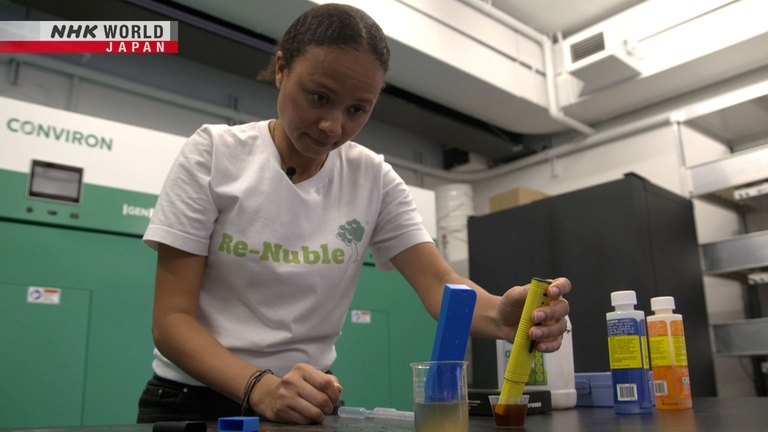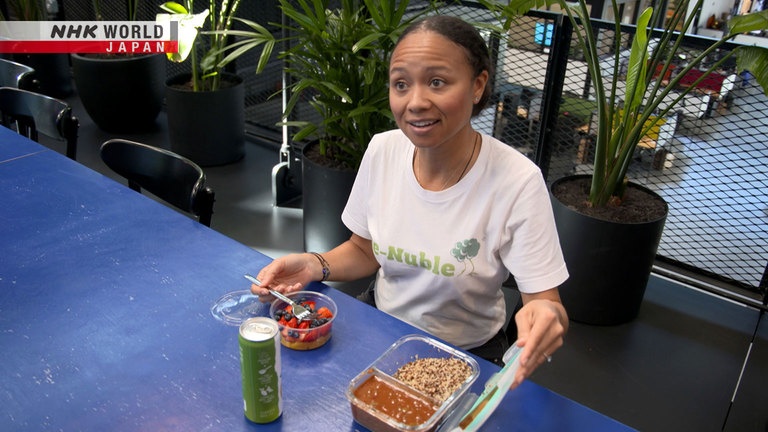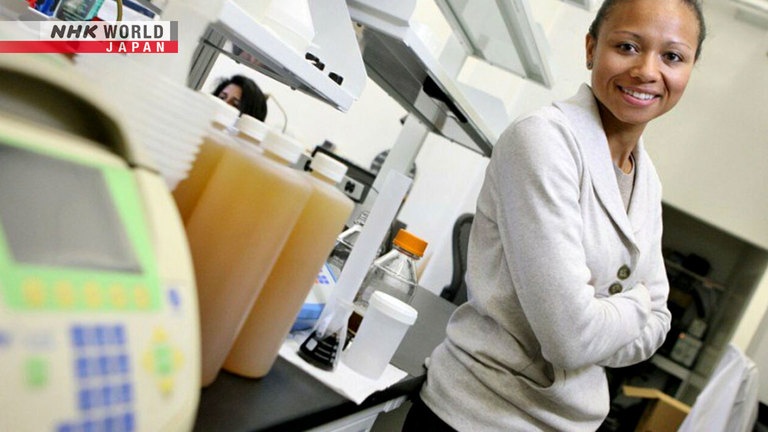Food Waste Into Nutrients!: Tinia Pina / Founder & CEO of AgTech Startup, Re-Nuble
Thanks to Tinia's innovative approach, her 8-employee urban start-up in Brooklyn, New York, provides safe and nutritious fresh produce with no environmental impact.



Transcript
Direct Talk
This is what a farm
may look like in the near future.
Agriculture is an
indispensable part of our lives
and many concepts to
realize sustainable communities
are being developed in the world today.
This young entrepreneur
has come up with an innovative idea
to supply safe and highly nutritious produce
in urban areas,
without impacting the environment.
Tinia Pina is the founder and CEO
of an agricultural technology startup
in the United States.
Tinia Pina
Founder & CEO of AgTech Startup, Re-Nuble
By socializing and
making this more of a movement,
we can change the remove
the need for chemical inputs in our food
and using food waste
to serve as a viable alternative.
We asked Tinia about the unconventional
and mind-blowing systematic way
to grow vegetables that she has developed.
Food Waste Into Nutrients
My aspirations and goal,
you know, I really am here to help
really kind of heal the Earth,
to be honest with you.
What we've seen in the U.S.,
even prior to COVID
and some of the supply chain
shocks that we've experienced here,
is that food waste, whether it's at the
retail or food service side,
it can be large or high in volume.
Supermarkets do carry fresh produce,
but quality isn't the same.
And then if someone were to
want to purchase organic produce,
it's often not carried at those supermarkets
located in underserved communities.
I would say residents and people that want to
be making a contribution to urban agriculture
is that they want to be able
to have more control
and have an impact on food grown locally.
And as a result,
by having more farms grow this way,
we can increase the supply of organic food
and therefore more people
can have access to it,
and at least an increased awareness of it.
To help solve such
food supply issues in the US,
Tinia developed a novel product.
We visited her research lab
located in Brooklyn, New York,to see it.
We're showing how
these different groups of tomatoes are seen,
how well they are able to
thrive under high heat,
so at least 30 degrees Celsius.
Here we're doing a germination test.
Are different ratios of our nutrients
helping the seedlings?
The great thing is,
remember, this is synthetic mineral salts,
this is Re-Nuble.
It's not a thick product
like fish fertilizer or manure.
The company currently
employs a staff of eight.
Its flagship product is the
original non-chemical fertilizer
that went on the market four years ago.
The main target is the
hydroponic growing system that uses water
to transfer dissolved nutrients
to a plant's root base.
So on the way we grow, you know,
we tout the fact that it's chemical free,
there's nothing about our process
as well as the raw materials
that we use that is chemical.
Hopefully we can have that
in other countries as well.
It took Tinia more than seven years of
research to develop the original product.
We asked her about the manufacturing process.
So Re-Nuble is
a play on the word "renewable."
We show it as, at least from the company,
as us being able to take the food waste
from the food manufacturer, in this case,
and taking their waste stream,
turning it into a finished product
that can be reintroduced to farms.
We receive the vegetative waste.
Think of broccoli remains or
leafy lettuce remains or even corn.
It's a mix.
From there, we receive it at our facility.
It goes through a pasteurization process.
The second step is
where we have developed this novel process
that incorporates a biological conversion,
as well as mechanical process
to make the nutrients
in the food waste soluble.
The third step is that
we do a several series of tests
as far as quality control,
make sure that there's no microbes
that could be food safety risk
before we fulfill it to customers.
The main reason for the food waste is,
I would say, poor planning and logistics
and means to measure that food waste.
So a great example here in New York City
is that we have our food waste
traveling far distances outside of the city
because cities often
don't have the infrastructure
to manage its own food waste.
There's a lot of emissions
or greenhouse gas emissions
that are associated with
just the hauling of waste.
And, you know, it really depends on the end.
If it goes to a composting facility,
typically, it requires three to four months.
During that time,
there are methane emissions that are residual
coming off from that composting process.
We remove that by not needing
to require that much time
and doing it closer proximity
to the source of food waste generation.
The startup is currently working with
eight commercial farms
and a number of resellers
who sell hydroponic systems to consumers.
But expanding the market isn't
the only thing Tinia is striving to achieve.
We do have an aspiration
to help farms at their location,
take their waste stream and turn it back into
sources of potable water
and biostimulants at the farm.
That has been the goal,
and we believe that
that has been of interest
because a lot of these farms
want to be able to show
that they're committing to sustainability,
using this closed-loop aspect.
The system she's developing utilizes
the upcycled wastewater and
vegetative food waste generated at the farm.
That process we're piloting with
a farm in Michigan that's 800 acres.
It's an apple orchard,
and that goal is to prove
how we're able to take their waste stream,
which is the wastewater and any residual
promise in this case, and turn it back
into a closed loop process for them.
Because as we've seen,
you know, there's a lot of,
in certain areas
where there's water scarcity,
we want to make these farms
able to be self-sufficient in their inputs.
And, how we can turn it into a source of
biostimulants or fertilizer for them.
And so that allows us to
not only put the best interests of the farm
in terms of revenue stream
because they can be sustainable
both environmentally and financially.
So if we can increase
the number of these farms,
that therefore increases
the volume of the type of produce
we would like to see more of
right organic and less chemically laden.
Tinia Pina has a lot on her plate every day
as the leader of her startup company.
Lunchtime is the one moment she can relax.
So today for lunch,
I'm having strawberries with blueberries,
which I often eat as a source of energy
and then on the side,
I have quinoa and beans,
and so that's source of protein for today.
My significant other and I cook every day.
We really like being able to
have as much flavor
and have control of
how we're cooking our food.
And so we plan our meals for lunches
and then we cook when we
get back home for the evenings.
It was actually lunchtime that gave her
the inspiration to create the company.
Born in 1983,
Tinia grew up in the State of Virginia.
I am not technically trained
as a horticulturalist
or a biologist or a plant scientist.
I went to Virginia Tech as someone that was
interested in information technology.
But what really kind of served
as the main impetus
or reason for why I founded Re-Nuble
was because during my time
in financial services here in New York City,
I was a pro bono SAT teacher
through New York CARES,
which is a completely
volunteer based program.
And on Saturdays,
from eight a.m. until three p.m.,
we were teaching
inner city schools schoolchildren,
and noticing what the kids
were eating for lunch,
often highly fried,
not the most nutritionally dense
or fresh food options.
I could see immediately
how their attention waned after lunch.
If they're not eating the ideal type of food,
then you know, there are other issues that
they are battling with related to nutrition
that's always going to serve
as a deficit for them
and put them at a disadvantage.
If people can have lifestyles
at which they're, it's more it's less stress,
eating better from a nutritional standpoint,
and just having one in which
is more aware of better options,
then yes, opportunity can be
available to those as well.
So having that immediate observation
also while knowing that
New York City was spending $77 million,
this is in 2012 to export their waste
to China, Pennsylvania, Virginia.
We will never have a direct impact
on their purchasing behavior
or changing their decision to eat this way.
But by socializing and
making this more of a movement,
we can change the, the remove the need
for chemical inputs in our food
and using food waste
to serve as a viable alternative.
After working in finance for seven years,
she launched her startup company in 2015.
We asked her if she had
any bumps in the road after the launch.
Many!
We are manufacturing
and manufacturing is
not the easiest to fundraise for
because it's capital-intensive.
We're developing a completely new product
and new process to create that product.
And so we were ahead of the investors.
But investors didn't realize the opportunity.
It wasn't just the investors.
She also had to convince farmers
in order to have them implement
her innovative method of growing produce.
My family,
I don't come from a family of farmers,
and it hasn't caused for a quick experience
in getting what we're doing out
there to the farming community.
But they want to grow this way,
and they just have not seen
a solution that won't introduce risks
such as food safety
or clogging up their system,
which causes an operational burden.
So the fact that we can demonstrate this
is what allows them to us
to to give them trust.
Tinia's slow but steady efforts
are gradually paying off
and now she is collaborating
with a municipality
in a public demonstration project.
It's in the city of Glens Falls
in New York State.
The company is working with the city
to build a pilot vertical
hydroponic farm in a vacant room
on the third floor of a commercial building.
This is the beginning of one of the
farming approaches for the future.
So this farm is intended
to be a public demonstration.
There's so many different versions
of urban agriculture.
And I think that's
what's the beautiful about it
is that everyone can have
a different approach,
a different interpretation.
And by no means should it be limited to,
you know, vacant parking lots
or modular spaces within buildings.
There's people even doing it in cabinets
within, you know, their apartment.
And so I think the most important drivers
are by increasing the accessibility,
as a result of accessibility,
you're making it more affordable,hopefully.
As a result of more affordability,
you're increasing the awareness and education
so that consciously
we can change the mindsets of people
to hopefully live in a more sustainable and
have a certainly a more healthier lifestyle.
Via social media, her company is
spreading the idea of the closed-loop system,
and the fact that by adapting it,
food can be grown in various environments,
even in desert soils.
In February this year, Tinia shared
her story and visions for the future
to the world at Expo 2020 Dubai.
You know, the dream would be
taking what we do here in the U.S.
and enabling agriculture economies
outside of the U.S.
so heavily in the Middle East,
in Singapore, in India and elsewhere.
For us, you know,
we try not to be pigeonholed
in one idea or concept or vision
as to how agriculture can take place
now and in the future.
Because we want to make sure that,
you know, people can grow food in
in an environment in which
we're increasing temperatures,
increasing erratic weather patterns.
We want to make it adaptable for any person.
And so it doesn't need to be
one specific solution,
but helping all farms
of all types and all sizes to
be able to be successful.
Finally, we asked Tinia
to write down her motto.
"When you reach the top, you should remember
to send the elevator back down for others."
It has not been easy or to start Re-Nuble,
but I've certainly had the privilege of
working with the community of supporters.
I should be able to send back down
my resources, my availability
to mentor others
so that others have a similar path
to being able to have the similar advantages
for their own success.